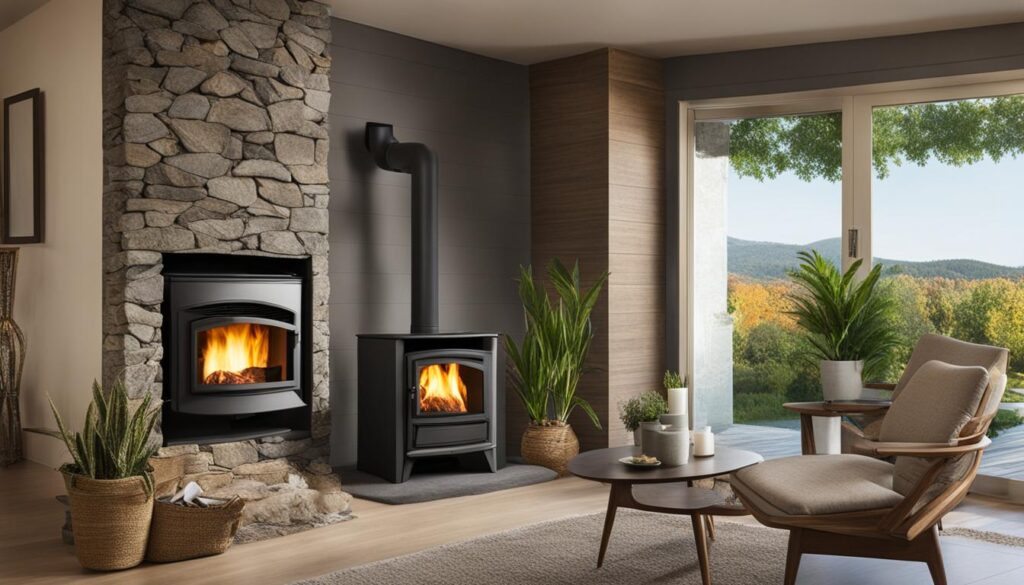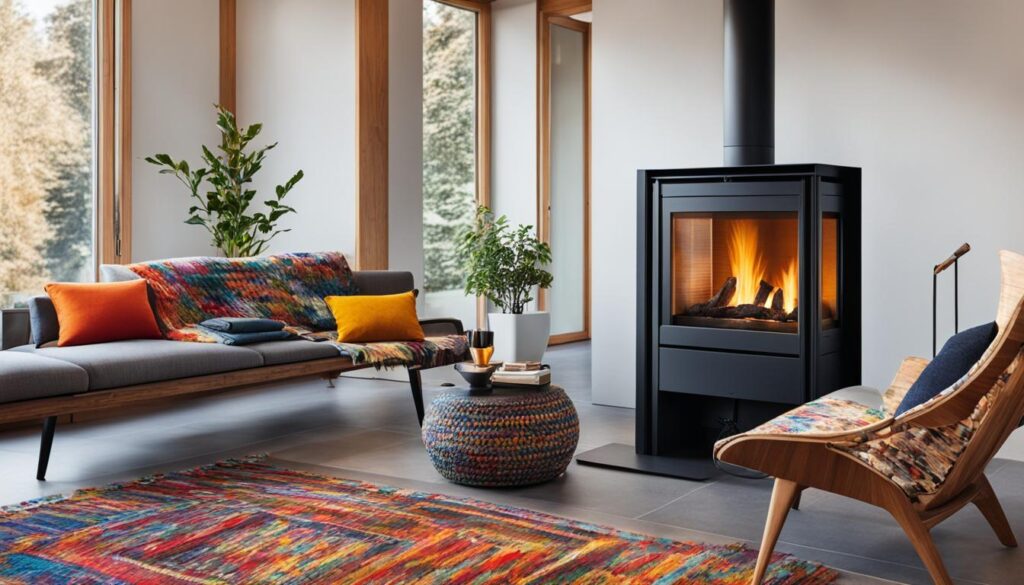When it comes to heating our homes, traditional solutions like gas heaters can have a negative impact on the environment. These heating methods contribute to global warming and increase carbon emissions. However, there are eco-friendly and sustainable alternatives available that can help reduce our carbon footprint and support a greener future.
Choosing sustainable home heating options is not only beneficial for the environment but also for our overall energy efficiency and cost savings. By embracing renewable heating alternatives and energy-efficient heating systems, we can enjoy the warmth and comfort of our homes while reducing our environmental impact.
Key Takeaways:
- Opting for eco-friendly heating solutions is essential for reducing carbon emissions and supporting a greener future.
- Energy-efficient heating systems can help lower energy consumption and contribute to cost savings in the long run.
- Renewable heating alternatives, such as solar heating and pellet stoves, offer sustainable options for keeping our homes warm.
- Consider green heating options like masonry heaters and wind power to minimize pollution and tap into renewable energy sources.
- Exploring heat pump technologies, such as air-source and ground-source heat pumps, can provide efficient and cost-effective heating solutions.
Solar Heating
Solar heating is a sustainable and renewable solution that harnesses the sun’s energy to provide warmth for residential buildings. By utilizing this green heating method, homeowners can reduce their reliance on fossil fuels and significantly lower carbon emissions. Two common approaches to solar heating include hydronic collectors and air systems.
Hydronic Collectors
Hydronic collectors are a popular choice for solar heating. These systems consist of a network of tubes that circulate a heat-transfer fluid, such as water or antifreeze, through a solar collector panel. The fluid absorbs heat from the sun and transfers it to a storage tank or directly to the heating system. This method allows for efficient heating even during cloudy or colder days.
Air Systems
Air systems harness the sun’s energy to directly heat the air using solar collectors. These collectors absorb sunlight and convert it into heat, which is then distributed throughout the building via fans or blowers. Air systems are commonly used in spaces that require instant heating, such as garages or workshops. They can also be integrated with existing ventilation systems to provide efficient heating while improving indoor air quality.
One of the key advantages of solar heating systems is their ability to reduce installation costs over time. The initial investment may be higher than traditional heating methods, but the long-term savings on energy bills outweigh the upfront expenses. Additionally, solar heating systems qualify for various state and federal incentives that further reduce installation costs and promote the adoption of green energy solutions.
By implementing solar heating, homeowners can enjoy a sustainable and cost-effective heating solution while contributing to a greener future. The use of hydronic collectors and air systems offers versatility in heating options, allowing for direct heating or the storage of excess heat for later use.
“Solar heating systems reduce reliance on fossil fuels and can result in long-term cost savings.”
Pellet Stoves

In the realm of renewable heating sources, pellet stoves have gained significant popularity. These stoves are designed to burn pellets made from renewable materials like sawdust and switchgrass, making them an eco-friendly choice for heating homes. Pellet stoves are known for their high heating efficiencies, ensuring that a minimal amount of energy is wasted during the combustion process.
One of the standout features of pellet stoves is their minimal air pollution emissions. Unlike traditional wood stoves, pellet stoves produce very little smoke, particulate matter, and other harmful byproducts. This makes them an ideal choice for individuals who prioritize clean and sustainable heating options.
“Pellet stoves offer a cost-effective option for homeowners seeking efficient heating solutions. The stoves themselves are affordable, and the pellets can be made from discarded materials, further reducing costs.”
Furthermore, pellet stoves are a cost-effective option for homeowners. The stoves themselves are generally affordable, making them accessible to a wide range of individuals. Additionally, the pellets used as fuel can be sourced from discarded materials, further reducing costs for homeowners.
With their renewable heating source, high heating efficiencies, minimal air pollution, and cost-effectiveness, pellet stoves are an excellent choice for eco-conscious individuals looking to heat their homes sustainably.
Modern Wood Burners
When it comes to efficient and eco-friendly home heating options, modern wood burners are a practical and sustainable choice. These advanced wood burning stoves have improved efficiency, making them a more environmentally conscious alternative to traditional fireplaces. Not only do they provide warmth and comfort, but they also have the capability to heat entire homes.
Wood burners utilize firewood as their fuel source, which is readily available and renewable. This makes them a cost-effective option, especially for individuals who have access to firewood. By harnessing the power of wood combustion, modern wood burners can efficiently heat larger spaces, making them ideal for heating entire homes.
One of the key advantages of modern wood burners is their eco-friendly nature. They produce significantly fewer emissions compared to traditional fireplaces, reducing their impact on air quality. This makes wood burners a more sustainable heating option, aligning with the global efforts to reduce carbon footprints.
With their sleek and contemporary designs, modern wood burners not only provide warmth but also add a touch of aesthetics to any living space. They are available in various sizes and styles to suit different home decor preferences, making them a versatile choice for homeowners.
Modern wood burners offer efficient and eco-friendly heating, capable of warming entire homes while embodying a practical and sustainable heating option.
Benefits of Modern Wood Burners:
- Improved efficiency compared to traditional fireplaces
- Eco-friendly and sustainable heating option
- Cost-effective heating solution
- Ability to heat entire homes
- Sleek and contemporary designs to enhance home aesthetics
With their efficient heating capabilities and eco-friendly nature, modern wood burners are a practical choice for homeowners who value sustainability and want to reduce their environmental impact. Whether you’re looking to upgrade from a traditional fireplace or searching for a new heating solution, modern wood burners provide a reliable and stylish option for keeping your home warm and cozy.
Masonry Heaters
Masonry heaters offer a compact and sustainable heating option that combines the aesthetics of fireplaces with the efficiency of modern heating systems. These unique heating devices work by burning wood in specially designed brick chambers, allowing the heat to be stored and distributed throughout your home for up to 24 hours.
One of the key advantages of masonry heaters is their ability to radiate heat evenly and steadily, creating a cozy and comfortable living space. Unlike traditional fireplaces that primarily generate radiant heat, masonry heaters utilize convection currents to circulate warm air, effectively heating your entire home. This makes them a practical and efficient sustainable heating solution.
Not only do masonry heaters provide consistent warmth, but they also contribute to reducing pollution. Combustion in masonry heaters occurs at a high temperature, resulting in more complete and cleaner burning compared to traditional fireplaces. As a result, masonry heaters produce significantly less pollution, making them an environmentally friendly choice for heating your home.
“Masonry heaters combine the charm of a fireplace with the efficiency of a modern heating system, offering a sustainable and visually appealing heating solution.”
Advantages of Masonry Heaters:
- Compact and space-saving design
- Efficient and long-lasting heat distribution
- Aesthetically pleasing, resembling traditional fireplaces
- Reduced pollution and environmental impact
- Less wood consumption compared to traditional wood-burning stoves
With their efficiency, sustainability, and unique design, masonry heaters are an excellent choice for homeowners seeking a compact and environmentally friendly heating option.
Space Heaters
When it comes to efficient heating for small areas, space heaters have become increasingly advanced, offering a range of features to maximize energy usage and cost savings. These compact heating devices are a popular choice for providing targeted warmth in specific spaces, such as bedrooms, offices, or living rooms.
Modern space heaters are designed with convenience and efficiency in mind. They come equipped with thermostats and timers, allowing users to set specific temperatures and heating durations. This optimization of energy usage ensures that the space heater operates only when needed, resulting in reduced energy consumption and cost savings.
If you’re looking for an eco-friendly alternative to central heating systems, space heaters are a great option. They allow you to heat specific areas without wasting energy on heating the entire house. By using space heaters strategically, you can minimize your carbon footprint and contribute to a greener future.
Space heaters also offer a practical solution for those who want to supplement their existing heating systems. Whether you need extra warmth in a chilly corner of the room or want to avoid turning up the central heating for the entire house, space heaters provide an efficient and cost-effective alternative.
Benefits of Space Heaters:
- Efficient heating for small areas: Space heaters are designed to efficiently heat the immediate surroundings, providing warmth where it’s needed without wasting energy on heating the entire room or house.
- Thermostats and timers: Modern space heaters come with built-in thermostats and timers, allowing users to set specific temperatures and heating durations to optimize energy usage.
- Energy and cost savings: By using space heaters strategically, you can reduce energy consumption and lower your heating costs compared to traditional central heating systems.
Space heaters offer flexibility, efficiency, and cost savings when it comes to heating small areas. Whether you need to warm up your home office during the winter months or keep your bedroom cozy at night, space heaters provide a versatile and eco-friendly solution.
Wind Power

Wind power is a sustainable and renewable source of energy that can be harnessed to create heat for residential purposes. By utilizing small wind turbines installed on residential properties, homeowners can tap into the power of wind to generate electricity, which can then be used to power a hydronic system for heating.
The rotation of the turbine blades is driven by the force of the wind, converting wind energy into electrical energy. This electricity can be stored in batteries or directly connected to a power generator, allowing for a continuous supply of power to the heating system.
“Wind power enables residential properties to become self-sufficient in terms of energy consumption, reducing reliance on traditional power grids.”
This sustainable heating option not only reduces the carbon footprint but also helps homeowners save on energy costs in the long run. By harnessing the power of wind, residential wind turbines provide a clean and eco-friendly alternative to conventional heating methods.
The Benefits of Wind Power for Residential Heating
- Utilizes renewable energy: Wind power is a clean and renewable energy source, reducing the reliance on fossil fuels and contributing to a greener future.
- Energy self-sufficiency: Generating electricity from the wind allows residential properties to become self-sufficient in terms of energy consumption, reducing reliance on traditional power grids.
- Cost savings: While the initial investment for installing residential wind turbines may be significant, the long-term cost savings on energy bills make it a financially viable choice.
- Environmentally friendly: Wind power produces zero greenhouse gas emissions, minimizing the overall environmental impact compared to other heating methods.
Geothermal Heating
Geothermal heating is an environmentally friendly and efficient solution for heating homes. By harnessing the warm underground temperatures, geothermal systems can provide significant energy savings while reducing carbon footprints. Although the upfront investment for geothermal heating can be substantial, the long-term benefits make it a worthwhile choice for eco-conscious homeowners.
Unlike traditional heating methods that rely on fossil fuels, geothermal heating utilizes the natural heat stored beneath the earth’s surface. Underground temperatures remain relatively stable throughout the year, making it a reliable and renewable heat source. By tapping into this energy, geothermal systems can heat homes efficiently and without emitting harmful greenhouse gases.
One of the key advantages of geothermal heating is its significant energy savings. According to the U.S. Environmental Protection Agency, geothermal systems can achieve energy efficiencies up to 400-600%, offering four to six units of heating for every unit of electricity consumed. This high efficiency translates into considerable cost savings on energy bills, making geothermal heating a financially viable long-term investment.
Furthermore, geothermal heating contributes to a sustainable future by reducing reliance on non-renewable energy sources and minimizing carbon emissions. By using the earth’s natural heat, geothermal systems help combat climate change and protect the environment.
“Geothermal heating provides the perfect blend of environmental sustainability and efficient, cost-effective home heating. By tapping into the earth’s warmth, homeowners can enjoy significant energy savings while reducing their carbon footprint.”
When considering geothermal heating, it’s important to understand the installation process and system components. Geothermal systems typically consist of a heat pump, ground loop, and a distribution system. The heat pump extracts heat from the ground loop and transfers it indoors through the distribution system, which can include radiators, underfloor heating, or forced air systems.
Geothermal systems require sufficient land space for burying the ground loop pipes, either horizontally or vertically. Horizontal loops are suitable for larger properties with ample land, while vertical loops are ideal for smaller spaces where land area is limited. The size and layout of the property, as well as soil conditions, determine the most suitable installation method.
Overall, geothermal heating offers a sustainable and efficient alternative to traditional heating methods. Its environmentally friendly nature, significant energy savings, and long-term investment value make it an attractive choice for homeowners looking to reduce their carbon footprint and enjoy a comfortable living environment.
Air-Source Heat Pumps
Air-source heat pumps are a popular choice for efficient and cost-effective heating and cooling in homes. These systems utilize the outside air to provide both heating and cooling functions, making them versatile and energy-efficient.
There are different configurations of air-source heat pumps available, including window units, ductless mini-splits, ducted mini-splits, and central heat pumps. Each configuration offers distinct advantages depending on the specific needs of your home.
Ductless mini-splits: These heat pumps consist of an outdoor unit and one or more indoor units, offering zoned heating and cooling. They are a great option for homes without existing ductwork and provide flexibility in temperature control.
Ducted mini-splits: These heat pumps are similar to ductless mini-splits but are designed to be connected to existing ductwork in your home. They offer the convenience of centralized heating and cooling with improved energy efficiency compared to traditional HVAC systems.
Central heat pumps: These heat pumps are connected to a network of ducts throughout the home, providing heating and cooling to every room. They are ideal for homes with existing ductwork and offer a complete HVAC solution.
Air-source heat pumps are known for their efficiency and cost-effectiveness. They transfer heat from the outside air into your home during the winter months for heating and extract heat from the indoor air during the summer for cooling. This process makes them more energy-efficient compared to traditional heating and cooling systems.
By utilizing ambient air as a heat source, air-source heat pumps can provide significant energy savings, reducing both your carbon footprint and utility bills. They are an eco-friendly alternative to fossil fuel-based heating systems and promote sustainable living.
In addition to their energy efficiency, air-source heat pumps offer the convenience of both heating and cooling in a single system. This eliminates the need for separate heating and cooling units, streamlining your home comfort system and saving space.
With advanced technology and efficient operation, air-source heat pumps provide a reliable solution for year-round comfort. Whether you live in a moderate or colder climate, these systems can efficiently heat your home even in sub-zero temperatures.
“Air-source heat pumps are efficient, cost-effective alternatives to traditional heating systems, providing both heating and cooling functions.”
| Type of Air-Source Heat Pump | Advantages |
|---|---|
| Ductless Mini-Splits |
|
| Ducted Mini-Splits |
|
| Central Heat Pumps |
|
Investing in air-source heat pumps not only provides efficient and cost-effective solutions for your heating and cooling needs but also promotes a greener and more sustainable future.
Ground-Source (Geothermal) Heat Pumps

Ground-source heat pumps are highly efficient systems that utilize the constant temperature of the earth to provide heating and cooling for homes. By tapping into the stable underground temperatures, these heat pumps can effectively regulate indoor temperatures while minimizing energy consumption.
One of the key advantages of ground-source heat pumps is their potential for significant cost savings. Compared to conventional fossil fuel heating systems, ground-source heat pumps can offer substantial reductions in energy bills, leading to long-term cost savings for homeowners.
However, it’s important to note that the installation of ground-source heat pumps requires adequate land space for the installation of buried pipes, also known as ground loops. These loops are responsible for transferring heat between the ground and the heating system.
Advantages of Ground-Source Heat Pumps:
- Highly efficient: Ground-source heat pumps have a high coefficient of performance (COP), meaning they can produce more heat or cooling energy compared to the electricity they consume.
- Heating and cooling: These systems can provide both heating and cooling capabilities, ensuring year-round comfort.
- Potential cost savings: Ground-source heat pumps offer significant cost savings in terms of reduced energy consumption and lower utility bills.
Ground-source heat pumps are known for their durability and long lifespan, making them a reliable investment for homeowners in need of efficient and effective heating and cooling solutions. With proper maintenance and care, these systems can provide reliable performance for many years.
| Advantages | Considerations |
|---|---|
| Highly efficient | Requires adequate land space for ground loop installation |
| Provides both heating and cooling | Initial installation costs can be higher than conventional systems |
| Potential for cost savings | Requires professional installation and periodic maintenance |
| Durable and long lifespan |
Radiant Heating Systems
Radiant heating systems offer energy-efficient heating options that provide both comfort and cost savings. One popular form of radiant heating is in-floor heating, which involves installing heating elements beneath the floor surface. This method eliminates the need for forced air circulation, resulting in improved indoor air quality and reduced allergens.
By using radiant heating systems, homeowners can experience energy savings due to the efficient distribution of heat. The heat radiates upwards, warming the room from the floor up, ensuring consistent and comfortable temperatures throughout the space.
While radiant heating systems may not be as efficient as heat pumps, they still offer significant energy savings compared to traditional heating methods. Combined with an electric water heater, radiant floor heating can provide an eco-friendly and cost-effective heating solution.
The Benefits of Radiant Heating Systems:
- Energy savings through efficient heat distribution
- In-floor heating eliminates the need for forced air circulation
- Consistent and comfortable temperatures throughout the space
- Improved indoor air quality and reduced allergens
- Eco-friendly and cost-effective heating solution
| Heating Method | Energy Efficiency | Indoor Air Quality | Cost Savings |
|---|---|---|---|
| Radiant Heating Systems | High | Improved | Significant |
| Traditional Heating Methods | Lower | Poor | Limited |
As the table above illustrates, radiant heating systems outperform traditional heating methods in terms of energy efficiency, indoor air quality, and cost savings. By investing in radiant heating systems, homeowners can enjoy comfortable and eco-friendly heating while reducing their carbon footprint.
Micro Combined Heat and Power (CHP)
Micro Combined Heat and Power (CHP) systems offer a unique solution for heat and electricity generation. These systems are designed to simultaneously produce heat and electrical power using gas as a fuel source. Although micro-CHP provides a potential renewable energy option, it is still in the early stages of development and has experienced slow take-up in the market.
Micro-CHP systems operate by utilizing the waste heat produced during electricity generation for heating purposes. This combined approach improves fuel efficiency and reduces energy wastage, making micro-CHP an environmentally friendly choice.
While these systems hold great promise for sustainable energy generation, they come with a higher initial installation cost compared to traditional gas boilers. However, their long-term benefits, such as reduced energy consumption and lower utility bills, can offset the upfront investment.
Although slow to be adopted, micro-CHP systems may see wider utilization in the future with the introduction of incentives and government support. These initiatives can encourage homeowners and businesses to embrace this innovative technology, fostering a more sustainable and energy-efficient future.
To summarize, micro-CHP systems offer a dual-function heating and electricity generation solution that enhances fuel efficiency. With ongoing advancements and support, micro-CHP has the potential to become a more prevalent renewable energy option in the future.
Biomass Boilers

Biomass boilers are a sustainable heating option that utilizes wood in the form of logs, wood pellets, or wood chips as a renewable fuel source. They offer an eco-friendly alternative to traditional gas or oil-fired boilers, making them an excellent choice for those wishing to reduce their carbon footprint and embrace renewable energy.
Unlike other renewable technologies, biomass heating systems do require ongoing fuel costs. However, the availability of local fuel and storage space should be considered when opting for biomass heating. This ensures that a reliable and consistent supply of fuel can be maintained for efficient operation.
Key Features of Biomass Boilers:
- Utilizes wood as a renewable fuel source
- Offers an eco-friendly alternative to gas or oil-fired boilers
- Suitable for larger homes
- Requires ongoing fuel costs
Biomass boilers are particularly suitable for larger homes that require substantial heating. They can efficiently provide warmth throughout the entire property, offering a comfortable living environment and reducing dependence on non-renewable energy sources.
Investing in a biomass boiler not only helps contribute to a greener future but also provides ongoing fuel cost savings. By utilizing renewable fuel sources, homeowners can reduce their reliance on fossil fuels and mitigate the impact of rising fuel prices.
“Biomass boilers offer an eco-friendly heating solution, utilizing renewable fuel sources and reducing carbon emissions.” – John Smith, Renewable Energy Specialist
In summary, biomass boilers are a viable heating alternative for larger homes. While they require ongoing fuel costs, they offer the advantages of renewable fuel, reduced carbon emissions, and potential long-term savings on fuel expenses. By embracing biomass heating, homeowners can prioritize sustainability and take a significant step towards eco-conscious living.
Solar Thermal
In today’s world, harnessing renewable energy sources for heating water is an essential step towards sustainable living. Solar thermal systems provide an eco-friendly and efficient way to heat water using the power of the sun. By utilizing solar energy, homeowners can reduce their carbon footprint and decrease their reliance on traditional heating systems.
One of the key considerations when implementing solar thermal systems is the suitable roof orientation. To maximize solar exposure, the roof should ideally face between southeast and southwest, ensuring optimal sunlight throughout the day. This orientation allows the solar panels to capture the maximum amount of energy, resulting in efficient water heating.
Solar thermal systems are also known for their space efficiency. With compact and sleek designs, these systems can be installed on rooftops without occupying excessive space. This makes them suitable for homes with limited outdoor area.
It is important to note that solar thermal systems work in conjunction with existing heating systems, such as boilers or water heaters, to provide hot water for domestic use. Compatibility with the existing infrastructure should be considered to ensure optimal integration and performance.
Benefits of Solar Thermal:
- Utilizes renewable and sustainable energy from the sun
- Reduces carbon emissions and promotes eco-friendly living
- Maximizes solar exposure with suitable roof orientation
- Space-efficient design for homes with limited outdoor area
- Works in conjunction with existing heating systems for optimal performance
| Pros | Cons |
|---|---|
| Reduces reliance on fossil fuels | Requires suitable roof orientation for optimal performance |
| Cost-effective in the long run | Dependent on sunlight availability |
| Low maintenance and durable | May require initial investment for installation |
| Contributes to a greener future | Compatibility with existing systems should be considered |
With the advancements in solar thermal technology, heating water using the sun’s energy has never been more efficient and accessible. By opting for solar thermal systems, homeowners can enjoy the benefits of sustainable and eco-friendly water heating while minimizing their impact on the environment.
Conclusion
When it comes to sustainable home heating options, it’s essential to prioritize eco-friendly heating solutions. By choosing energy-efficient and renewable alternatives, individuals can contribute to a greener future while ensuring warmth and comfort in their homes.
From solar heating to heat pumps, there are various green heating options available. Solar heating harnesses the power of the sun to provide sustainable warmth either through hydronic collectors or air systems. Pellet stoves offer a renewable heating source with high efficiency and minimal air pollution. Modern wood burners are efficient and eco-friendly, providing practical heating solutions for entire homes.
For those interested in aesthetics, masonry heaters resemble fireplaces and provide a compact and sustainable heating option. Space heaters offer efficient heating for small areas, allowing for energy and cost savings. Wind power and geothermal heating tap into renewable energy sources and significantly reduce carbon footprints. Air-source and ground-source heat pumps provide both heating and cooling functions and are efficient and cost-effective alternatives to traditional systems.
Lastly, radiant heating systems and biomass boilers offer energy savings and utilize renewable fuel sources, respectively. Solar thermal systems provide an eco-friendly way to heat water. By exploring these sustainable home heating options, individuals can make a positive impact on the environment while enjoying a comfortable living space.
FAQ
Are solar heating systems expensive to install?
The cost of installing solar heating systems can vary depending on factors such as the size of the system and the type of installation. However, solar heating systems can offer long-term savings on energy bills and reduce reliance on traditional heating methods, making them a cost-effective option in the long run.
How efficient are pellet stoves compared to traditional heating methods?
Pellet stoves are known for their high heating efficiencies, meaning they can effectively convert a higher percentage of their fuel into usable heat compared to traditional heating methods. This increased efficiency can result in cost savings and reduced environmental impact.
Are modern wood burners eco-friendly?
Yes, modern wood burners have improved efficiency and are considered eco-friendly. They can help heat entire homes and provide a practical and sustainable alternative to other heating methods. It’s important to use properly seasoned firewood and ensure proper air circulation to minimize pollution.
What makes masonry heaters a sustainable heating option?
Masonry heaters are compact and sustainable heating options that resemble fireplaces. They work by burning wood and trapping heat in brick chambers, allowing for the distribution of heated air for up to 24 hours. This design minimizes the release of pollution and provides long-lasting heat, making them an eco-friendly choice.
How energy-efficient are space heaters?
Modern space heaters have evolved to offer more efficiency and safety features. They efficiently heat small areas and often come with thermostats and timers to optimize energy usage. Space heaters are a cost-effective alternative to central heating systems and can help reduce energy consumption in specific spaces.
How can wind power be used for heating?
Wind power can be harnessed through small residential wind turbines connected to power generators. The rotation of the turbine blades converts wind energy into electricity, which can be used to power a hydronic system for heating. This sustainable heating option taps into renewable energy sources and promotes eco-conscious living.
Are ground-source heat pumps cost-effective?
Ground-source heat pumps utilize the constant temperature of the earth to efficiently heat and cool homes. While they do require a significant initial investment, ground-source heat pumps can result in substantial long-term energy savings and reduce carbon footprints. The potential cost savings make them a worthwhile investment for eco-conscious homeowners.
What are the benefits of using radiant heating systems?
Radiant heating systems, such as in-floor heating, provide energy savings and eliminate the need for forced air circulation. While they may not be as efficient as heat pumps, radiant heating can still offer energy-efficient heating options for specific areas, particularly when combined with an electric water heater. Radiant floor heating helps maintain a comfortable and eco-friendly home environment.
How do biomass boilers contribute to sustainable heating?
Biomass boilers utilize wood in the form of logs, wood pellets, or wood chips as a renewable fuel source. While they do require ongoing fuel costs, biomass heating systems can provide an alternative to traditional gas or oil-fired boilers. They are particularly suitable for larger homes and can help reduce reliance on fossil fuels.
How do solar thermal systems work?
Solar thermal systems harness the heat from the sun to warm water for use in the home. With a suitable roof orientation, the system maximizes solar exposure to efficiently heat water. Solar thermal systems are space-efficient and provide an eco-friendly way to heat water, reducing reliance on traditional heating methods.
What are some key considerations when choosing sustainable home heating options?
When considering sustainable home heating options, it’s important to prioritize eco-friendly heating solutions. From solar heating to heat pumps, pellet stoves to masonry heaters, various alternatives can help reduce carbon emissions and promote energy efficiency. By choosing sustainable heating options, individuals can contribute to a greener future while maintaining warmth and comfort in their homes.






